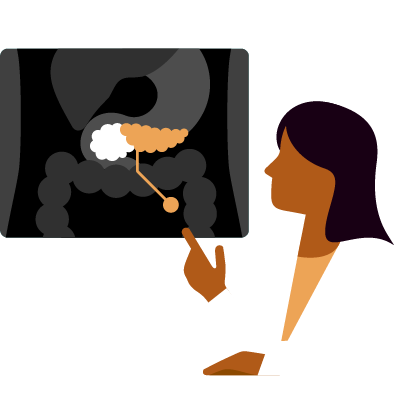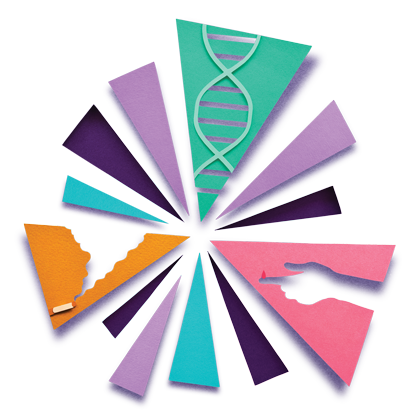How to Eat with Pancreatic Cancer

If you have pancreatic cancer, getting the nutrients you need can be a challenge.
You might have a poor appetite and struggle to consume enough calories to maintain a healthy weight. You might even feel nauseous at the thought of eating—and for good reason.
According to Maria Petzel, a registered dietitian at MD Anderson Cancer Center (Houston, Texas), the pancreas plays a key role in digestion. The fish-shaped organ not only produces and releases enzymes that break down proteins, fats, and carbohydrates, but it also regulates blood sugar levels, controlling the release of insulin and glucagon into the bloodstream.
It makes sense that pancreatic cancer affects what (and how) you eat. With pancreatic cancer, you might face reduced appetite, inflammation in the gut, and difficulty digesting and absorbing nutrients. What’s more, pancreatic cancer can affect your ability to build and maintain muscle mass.
Better Eating Strategies
Whether you have surgery to remove a pancreas tumor, or you’re undergoing chemotherapy and radiation (or some combination of all three), pancreatic cancer takes a toll on your body. The good news: These eight strategies can help bolster your nutrient reserves so you can better tolerate treatment:
- Control side effects.You can set out to make the best nutrition decisions during your treatment journey, but if you’re unable to control side effects like nausea, vomiting, and appetite loss, your best-laid plans are meaningless. “If your nausea is not well controlled on a standard anti-nausea regimen, talk to your oncologist so they can devise a plan for the next cycle for better nausea control,” Petzel says.
- Focus on cycles. Treatments like FOLFIRINOX have significant effects on appetite, and they may cause nausea, diarrhea, or constipation. If you approach nutrition with treatment cycles in mind, you’ll be able to build back your nutrient stores during the window of time between cycles when you begin to recover your appetite. “The goal is to capitalize on the good days and do your best to minimize the deficits on the bad days,” Petzel explains.
- Stay hydrated. Drinking fluids is essential for everyone, but it’s especially important when you’re undergoing cancer treatment. Getting sufficient water and electrolytes is critical for every bodily function, from circulation to detoxification. And if you’re low on energy, nutrient-packed fluids can substitute for meals. Aim to drink half of your body weight in ounces (e.g., if you weigh 150 pounds, drink 75 ounces of fluid daily), including water, vegetable juices, and nutrient-rich broth. Tea and coffee are okay in moderation, but it’s best to avoid drinks that have added caffeine (like soda and energy drinks). Steer clear of alcohol. It’s dehydrating.
- Prioritize protein. When it comes to creating a hierarchy of nutrients, Petzel recommends fluids first, then protein. Protein helps repair and rebuild damaged cells. Cancer treatments, surgery, and recovery increase how much protein your body needs each day. But your body can only synthesize about 25-30 grams at one time, so it is important to divide up your protein intake—most people who have pancreatic cancer will need to eat three to four times per day to meet protein needs. In general, you need at least 1/2 gram of protein for every pound of body weight (e.g., if you weigh 150 pounds, you should aim for about 75 grams of protein per day). Ask your dietitian or healthcare provider for your specific daily goal. Good sources include fish, poultry, lean meat, eggs, low-fat dairy products, beans, lentils, nuts, and seeds.
- Eat small, balanced meals. People with pancreatic cancer tend to do best when they eat several small meals throughout the day (small meals are often better tolerated when you’re managing appetite loss and nausea). Whether you’re eating a meal or snack, include protein, fiber, and fat in every meal. So instead of eating a piece of whole fruit by itself, Petzel recommends combining the fruit with some fat and protein. Spread apple slices with peanut butter, for example, or pair a pear with cubes of cheese. “That will help you avoid big blood sugar spikes and crashes that can happen when eating carbohydrates alone,” Petzel says. “It also ensures that you’ll get additional calories and protein.”
- Consider pancreatic enzymes. If your pancreas has suffered loss in function because of a tumor or treatment, it may not be able to make the digestive enzymes your body requires to process food from your gastrointestinal tract. This can cause unpleasant GI symptoms and/or weight loss. The good news: You can improve symptoms by taking a prescription pancreatic enzyme replacement to ensure you are breaking down and absorbing the nutrients from food. Unfortunately, there’s no “one-size-fits-all” approach to the number of capsules each person needs. Instead, dosing depends on what you eat and how much function your pancreas has lost. It’s important to work with your healthcare team to identify the exact amount needed for optimal digestion. “Since taking too much enzyme replacement can cause constipation, I recommend starting patients at the lower end of the dosing range and titrating up from there,” Petzel suggests. “You may not notice an immediate benefit from the start-up dose, but when we increase every few days, the benefits become apparent and the best dosage becomes clear.” While over-the-counter digestive enzyme products are available, it’s best to use prescription pancreatic enzymes because these are FDA-approved, ensuring purity and strength.
- Work with a dietitian. Pancreatic cancer is complex. Nutrient needs depend not only on your stage of disease, but also on your course of treatment. To best navigate the disease, team up with an experienced dietitian who is well-versed in oncology nutrition, diabetes management, and pancreatic enzymes. A skilled dietitian will monitor you for signs of pancreatic insufficiency, appropriate blood sugar management, and malnutrition.
- Pay attention to your poop. Both pancreatic cancer and its treatments can wreak havoc on your gastrointestinal tract. An early sign that your pancreas is struggling to keep up with demand is a change in the frequency or consistency of your bowel movements. Do you have diarrhea? Do you have frequent loose stools? Constipation, bloating, and gas? Make sure to share these changes with your healthcare team. You may need to make some dietary or medication changes or add pancreatic enzymes to your daily meals.
Take-Home Nutrition Tips
Unfortunately, there’s no standard diet for people who have pancreatic cancer. While some foods may nourish one patient, those very same foods might worsen symptoms in another.
Still, Petzel recommends emphasizing whole, nutrient-rich foods and limiting empty calories.
Foods to Eat
- Lean protein, such as fish, poultry, eggs, and low-fat yogurt
- Plant-based protein, such as beans, nuts, and nut butters (almond, cashew, peanut)
- Vegetables, fruits, and whole grains
- If having trouble eating, add home-made smoothies or low-sugar nutrition supplement drinks.
Foods to Limit or Avoid
- High-fat meats and dairy products
- Processed foods and snacks
- Foods and beverages with added sugar
- Alcohol
Most important, keep moving. Exercise is one of the best things you can do to support both body and mind during treatment and beyond. Studies show that physical activity can help increase the release of feel-good hormones.




